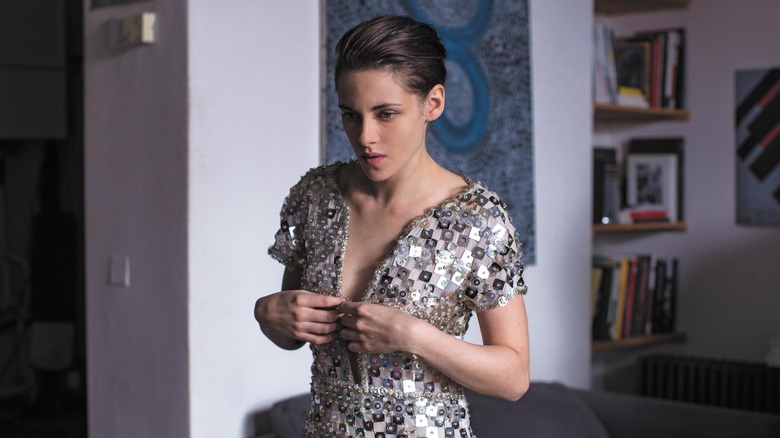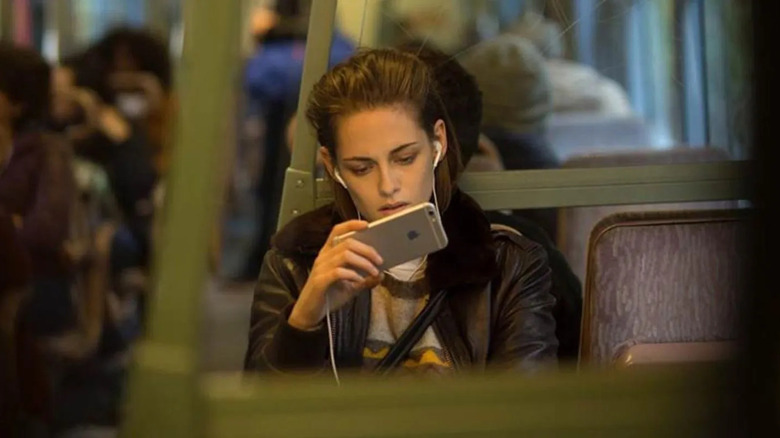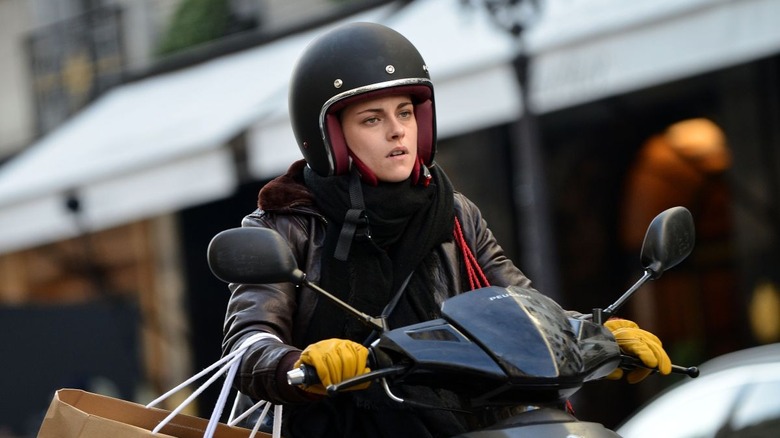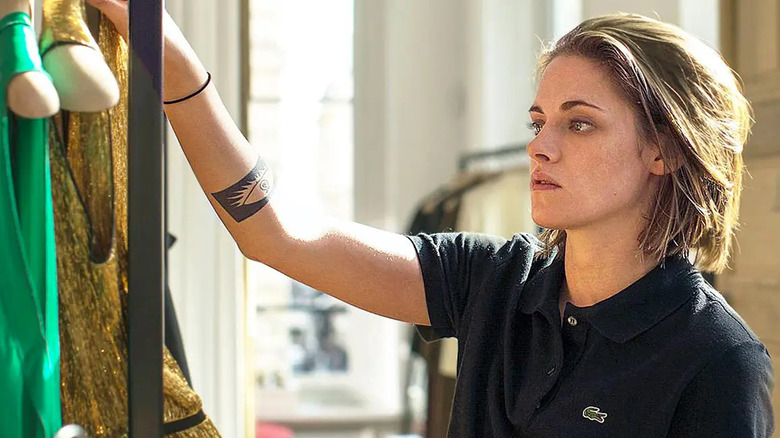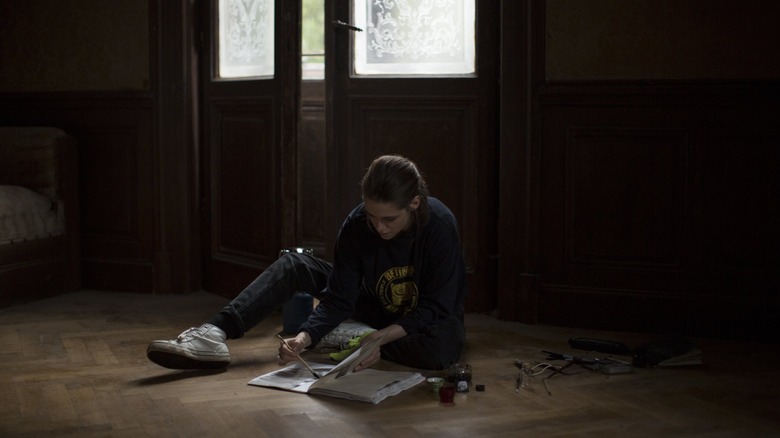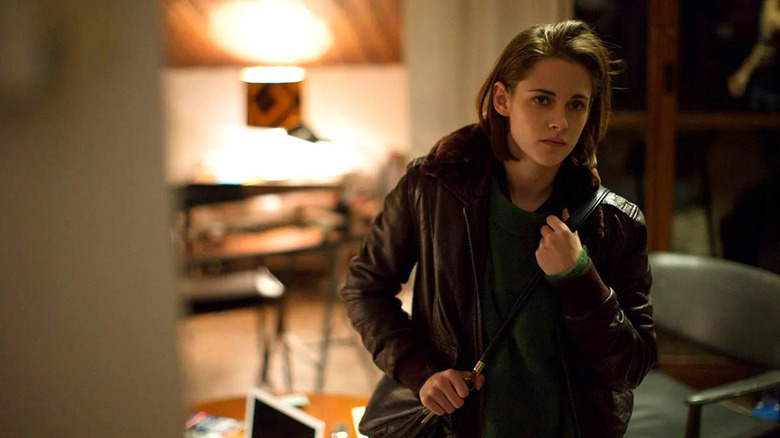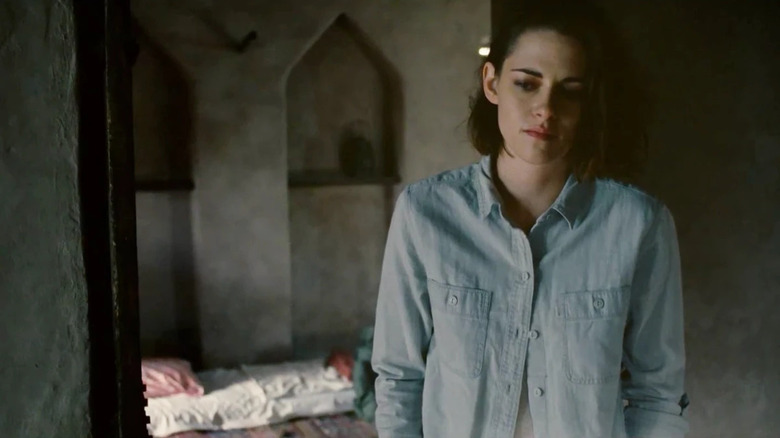Personal Shopper Ending Explained: Kristen Stewart Talks To Dead People
Do the spirits of the recently departed hang around to watch over those they left behind? It's a question that Oliver Assayas pointedly refuses to answer in his supernatural mystery "Personal Shopper," leaving the viewer to draw their own conclusions by the intriguingly ambiguous ending. While it's a film that will madden people who like everything spelled out for them, it provides plenty to chew on for those who like to puzzle things out for themselves. Even so, the conclusions you arrive at will likely be influenced by your own beliefs or unanswered questions about the supernatural and the afterlife.
One thing we can say for certain is that the film provides an excellent showcase for Kristen Stewart. It has been fascinating to watch how she and her "Twilight" co-star Robert Pattinson have developed since playing their breakthrough roles in the dreary five-part adaptation of Stephanie Meyer's sappy teen vampire saga. Those movies didn't give either of them much to work with, but it was evident that we were watching two very talented young actors paying their dues before moving on to better things.
Pattinson has become one of Hollywood's most interesting actors, trading equally in juicy supporting roles ("Tenet," "The Lost City of Z"), working with auteurs like David Cronenberg and Claire Denis ("Cosmopolis" and "High Life"), and breaking through into blockbusters ("The Batman"). Stewart has quietly trod a similar path, veering from popcorn monster movies ("Underwater") to Euro arthouse fare ("Clouds of Sils Maria").
Her acclaimed turn in the latter led to her re-teaming with Assayas for perhaps her best performance to date in "Personal Shopper," a film so elusive that even the director himself talks at cross-purposes with what we actually see on the screen (more on that later). So what happens exactly?
So what happens in Personal Shopper again?
Maureen Cartwright (Stewart) finds herself adrift in Paris after the sudden death of her twin brother Lewis. He suffered a genetic heart condition which she also shares, as well as the gift of mediumship. Wrought with grief, Maureen dutifully works as a personal shopper for Kyra (Nora Waldstätten), a very wealthy supermodel, but all that keeps her in the French capital is the possibility that her brother will make contact with her from the afterlife, as promised while he was still alive.
The film opens with Maureen spending the night in Lewis's old house to see if she can pick up any signals from her brother before his girlfriend Lara (Sigrid Bouaziz) sells the place. She feels a presence but can't say for certain who or what it is, and discovers a spooky cross-like symbol scratched into a wall. The paranormal activity grows stronger on a second visit; the bathroom taps turn on by themselves, her drawings are defaced, and she is confronted by a female apparition who seems tormented.
In between, Maureen meets her boss's lover, Ingo (Lars Eidinger), who Kyra is planning to dump. He seems uncommonly interested in Maureen and she opens up to him. Later, she starts receiving unidentified texts, which she, at first, thinks might be from Lewis. The messenger's tone becomes more dominant as they encourage her to try on Kyra's expensive designer clothes (which is forbidden) and leave her a key card for a hotel room. Maureen visits the room to find no one there and discovers that it was paid for in cash under her name. This is where "Personal Shopper" takes a detour into thriller territory — as Maureen finds Kyra brutally murdered and evidence that her mystery admirer is trying to frame her.
Is Maureen a ghost?
"Personal Shopper" is a challenging film that has generated a huge amount of fan theories online. The idea that Maureen is a ghost pops up a lot and it is closely related to the next point, although it is fairly easy to dismiss. We see Maureen interacting with several people throughout the movie in two-way conversations (unlike "The Sixth Sense"), although some devotees of this theory might still point to the final line of the film as evidence.
One of the ironies of "Personal Shopper" is that while Maureen may be alive and coping with her brother's death, she is trapped in a ghost-like state, following a repetitious pattern of actions as she shuttles to and from designer boutiques to Kyra's apartment, drifting in and out barely noticed, and stuck in limbo just waiting in case Lewis makes contact. So many ghost stories focus on a spirit who is unable to move on due to unfinished business among the living; Maureen is in exactly the same situation. Assayas has offered some insight into his thoughts on this (via The Ringer):
"I don't believe in ghosts in the literal sense. Maybe I believe in ghosts if we agree that 'ghosts' is a code word for something else — the fact that we have to deal with invisible presences within us and outside of us. We constantly have some sort of conversation with something that's not exactly there."
That leads to another aspect of disconnection in the film that affects pretty much everybody nowadays. We are always connected to people while rarely present physically, our conversations spread out over hours, days, and weeks to the point that they become cryptic. We are all coming through from the other side, albeit just from the other side of a wifi connection.
Was Maureen murdered in the hotel room?
There initially seems to be some credence to this theory. After Maureen's stalker provides her with a key card for a hotel room and encourages her to try on Kyra's clothes, Maureen discovers Kyra's body while dropping off some expensive Cartier jewelry. She runs away from the scene of the crime, which attracts the suspicion of the French detective on the case, and finds that someone has planted the jewels in her flat.
It seems pretty obvious that the stalker is Ingo, taking advantage of the information Maureen shared with him to mess with her head. Bitter about getting dumped by Kyra, he hatches a plan: Get Maureen to behave in an uncharacteristic manner and reserve a hotel room in her name, paying in cash. He then murders Kyra and stashes the jewelry at Maureen's place to provide a motive. All he has to do now to tie up the loose ends is lure Maureen back to the hotel and kill her too, making it look like a death by suicide.
This seems pretty straightforward, although it leads to one of the trickiest passages of the film. We see Maureen change her SIM card before hurrying to the hotel room; she hears someone enter, but we don't see who. We then witness an unseen entity leaving the hotel, shortly before Ingo leaves the room. Once he gets outside, he is apprehended by two plain-clothes cops and we later learn he confessed to the murder.
We never see Maureen leave the room, which leads some people to believe the spirit leaving before Ingo is her ghost. However, that goes the same way as the theory that she is a ghost in general because we still see her talking to people after the hotel incident.
Why does Maureen behave so irrationally?
When I first saw "Personal Shopper" I was really annoyed by Maureen's behavior. Assayas manages the feat of making somebody texting incredibly suspenseful, culminating in a sequence of angry messages as the stalker gets ever closer to her front door. Even so, I couldn't help thinking, "Why is she still talking to this creep?" "Why doesn't she call the cops?" and "Why doesn't she just get out of there?"
I thought it was pretty obvious that the sender of the messages wasn't Lewis after the first few back-and-forths, but then Maureen maybe clings to the idea for far longer, simply because she wants to believe it is her brother. Then she starts confiding in the mystery messenger, leaving herself open to manipulation. Now he's encouraging her to indulge in the forbidden practice of trying on Kyra's clothes and visiting an anonymous hotel room without any idea who might be waiting for her there.
Maureen seems like quite a level-headed person, so all this seems like really irrational behavior. The key to this is how Stewart portrays Maureen's grief; it is all directed inward, and we can see how the intense effort of containing it causes her almost physical discomfort. It's in the deep lines under her eyes and her coiled, twitchy body language. She's ready to burst and needs some release.
I think Maureen before Lewis's death would have told the stalker to f*** off in no uncertain terms, but the mystery of the messenger and the illicit thrill of trying on Kyra's clothes gives her a chance to feel something other than overwhelming grief. It is an opportunity she gratefully but guiltily embraces.
Doe ghosts exist in the world of Personal Shopper?
This is a tricky one because we can't necessarily rely on Maureen's perspective on things. Her judgment is clouded by grief and she seems determined to interpret anything out of the ordinary as Lewis's presence, making her an unreliable narrator. Even so, we can reason out whether the ghostly occurrences in the movie are real or not.
The scratch marks on the wall of Lewis's house and Maureen's defaced drawing aren't proof, given that she could have easily done all that herself. As for the ghost she sees in the house vomiting ectoplasm, that could also be a figment of her over-stressed mind.
During a press conference, Assayas really opened up about the presence of ghosts in "Personal Shopper:"
"To me, it's pretty clear that Maureen finds some sort of reconciliation, that she realizes that all this while there were no ghosts, her brother was not really speaking to her, but it was her own path to find herself and somehow survive the loss of her brother and really find her identity, not as the twin of Lewis."
It's disappointing to hear the writer and director of such a deliberately enigmatic film giving such a black-and-white answer, but that doesn't account for the one ghost in the film that is presented as objectively real. Toward the end, Maureen is sitting in Lara's garden and we get a glimpse of a male figure in the kitchen window behind her, holding a glass. She is only alerted when the glass drops and smashes on the floor. Ironically, this is the first time she doesn't attribute something odd happening to paranormal activity, supporting the idea that this apparition was really there. But is it actually Lewis, or has another spirit attached itself to Maureen?
Personal Shopper ending explained
At the end of "Personal Shopper," Maureen goes to visit her boyfriend in the mountains of Oman. As soon as she arrives at her modest lodgings, the ghost performs the glass-smashing trick again, which she sees this time. She asks a series of questions to which the unseen presence responds with one knock for "yes" and two for "no" (paying off an earlier scene that references Victor Hugo's seances).
The answers that the spirit gives are pretty inconsistent, and Maureen suddenly doubts it is her brother. Then she finally asks, "Is it you Lewis... or is it me?" The response is one knock and a half-smile crosses Maureen's face before we fade to bright white.
There are two possibilities here, discounting the idea that the last affirmative knock means Maureen is a ghost herself. The first is that ghosts really exist and a combination of Maureen's grief and sixth sense has enabled whoever it is to come through. The second is that the spirit is a manifestation of Maureen's grief powered by her determination to believe in the afterlife. Given that Maureen and Lewis both seem to have clairvoyant abilities, we could also take that last question another way. Is it Lewis making himself known to Maureen, or is it her ability that has lifted the veil so they can finally communicate?
However you read it, the most important thing is that when she receives confirmation with the last knock, her face visibly brightens for the first time in the whole film. Whatever she takes from the response, it is something that instantly lifts a great weight from her soul.
